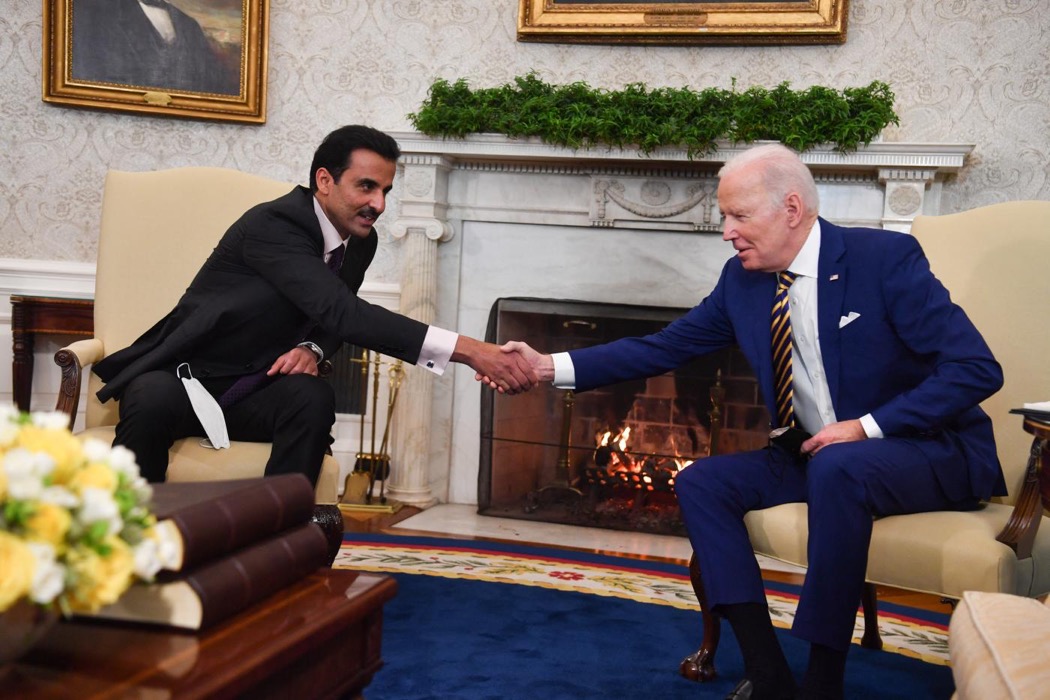[ad_1]
US President Joe Biden is expected to use his visit to the Middle East to push Saudi Arabia to normalise diplomatic and economic relations with the Zionist state, but should Qatar follow its GCC neighbours?
Joe Biden’s first trip to the Middle East as president, which sees him visit Israel before heading directly to Saudi Arabia, has raised questions on whether the US president will manage to convince the Saudis to normalise ties with Tel Aviv – and whether authorities in Doha will follow suit.
In Saudi Arabia, Biden is scheduled to attend a high-profile summit with the Gulf Cooperation Council (GCC), where he is expected to meet with leaders of the bloc, Press Secretary Karine Jean-Pierre announced last month.
Iraq, Egypt and Jordan have been confirmed as the three non-GCC states to also attend the summit – the latter two of which already have full diplomatic relations with the occupying Zionist state.
“On Friday, I will also be the first president to fly from Israel to Jeddah, Saudi Arabia. That travel will also be a small symbol of the budding relations and steps toward normalisation between Israel and the Arab world, which my administration is working to deepen and expand,” Biden said.
“In Jeddah, leaders from across the region will gather, pointing to the possibility of a more stable and integrated Middle East, with the US playing a vital leadership role.”
The potential development of open relations between some Gulf Arab states and the Israeli regime, as clearly outlined by the US president, spearheads a new significant dynamic of the 21st century Middle East region.
Whether Saudi Arabia moves forward with such a controversial move or not, analysts believe Doha seems unlikely to follow suit, especially due to its staunch position on defending the rights of Palestinians. Such sentiment has been echoed in speeches by its most senior officials, including the Amir Sheikh Tamim bin Hamad Al Thani, across the globe and on many occasions.
Qatar is also adamant to maintain and safeguard its independent foreign policy – a point of contention that led to an illegal air, land and sea blockade on the Gulf state by neighbouring Saudi Arabia, the United Arab Emirates, Bahrain and Egypt in 2017.
‘The politics have shifted’
Doha’s more recently elevated and recognised status as a heavyweight mediator, which has arguably served as its most strategic move on the geopolitical stage, has also earned it indispensable credibility on the Arab street and further afield.
A controversial move to normalise with Israel could tarnish such a reputation, throw a spanner in the works and impede Doha’s future endeavours to stand as a mediator in any final status negotiations – or even when trying to bring an end to one of Israel’s regular wars on the Palestinians.
In an op-ed penned by Zaid Al-Hamdan on Doha News, the Qatari political analyst said: “Qatar has cemented its position as a diplomatic powerhouse and will not be forced to make concessions, particularly with the US administration’s current position” on a range of issues expected to arise during Biden’s trip to the Middle East.
While addressing the condition of geopolitics in the region should Riyadh and Tel Aviv normalise ties, another analyst told Doha News he believes: “the politics have already shifted in the region but more will occur if official ties are established.”
“Iran will be the biggest winner by attracting all those who view Israel as an objectionable state. Hamas and other Sunni entities [will be] at war with Israel. This may increase tensions in the region and may lead to another Palestinian intifada and region wide conflicts including in Gulf states,” Ali Al Ahmed, founder and director of the Washington-based think tank Institute for Gulf Affairs, told Doha News.
Biden’s visit comes amid a gradual US withdrawal from the region and analysts argue the US president’s direct flight to Saudi Arabia from Tel Aviv serves as a symbol of incoming relations, which he is expected to facilitate.
“In the short term, it is highly unlikely that Saudi Arabia will normalise relations with Israel […] Saudi and Israel have had decades of secret ties and cooperation but official interaction remains limited,” Al Ahmed said.
Commenting on potential normalisation between Doha and Tel Aviv, Dana El Kurd, assistant professor at the University of Richmond told Doha News that a “full” establishment of ties is unlikely.
“What we have to recognise is that normalisation comes in different forms. So if we’re talking about an official diplomatic recognition, something like the Abraham Accords, I doubt that,” El Kurd said.
“But there are other types of normalisation, like cultural normalisation, things having to do with sports and academia and things like that. That’s already being pursued and underway, especially with the World Cup,” she said referring to the upcoming FIFA event, which stipulates all host nations must allow access to football fans without discrimination.
While Qatar has yet to comment on that, it has confirmed no direct Israeli flights will be established for the duration of the tournament later this year.
However, “in terms of something along the lines of what we’ve seen with the UAE or Bahrain, I doubt that that’s going to happen,” El Kurd added.
Qatar’s stance on normalisation
In the year 2020, neighbouring states flocked to normalise ties with the Israeli regime, with the United Arab Emirates and Bahrain signing the controversial Abraham Accords to solidify all diplomatic relations.
Morocco and Sudan shortly followed suit despite public outrage and opposition in both countries.
In September of that same year, Lolwa Al Khater, Qatar’s foreign ministry spokesperson at the time, affirmed that normalising relations with Israel “can’t be the answer” to the decades long illegal occupation of Palestine and categorically ruled out rumours that Doha would join other Gulf Arab states in establishing diplomatic ties with Israel.
Qatar, unwavered by the growing trend, has maintained its commitment to the 2002 Arab Peace Initiative, ironically drafted by Saudi Arabia, which stipulates that member countries shall refrain from normalising with Israel until it fully withdraws from lands occupied in 1967.
In February, Qatar’s Foreign Minister Sheikh Mohammed bin Abdulrahman Al Thani also echoed Al Khater’s words and dismissed the potential signing of the Abraham Accords in the “absence of a real commitment to a two-state solution.”
Diving further into the issue, Sheikh Mohammed told Axios that his country had previously maintained ties with Tel Aviv “when there were prospects for peace” with the Palestinians, but it “lost hope” following the Israeli onslaught on Gaza in 2008.
Labelled “Operation Cast Lead,” the three-week brutal Israeli bombardment on the besieged Gaza Strip killed at least 1,436 Palestinians including 410 children.
Speaking at the fourth annual Global Security Forum in Doha in October, the top Qatari diplomat doubled down on his position against the controversial Abraham Accords, saying it does not align with Doha’s foreign policy.
“This is our foreign policy, we see that the core of the issue is the occupation. So as long as there is no prospect for ending that occupation and having a fair and just solution, I don’t see Qatar taking such a step for normalisation,” he detailed.
However, Dr Clive Jones, professor of Regional Security at Durham University, told Doha News that the relationship between Qatar and Israel “is conducted behind semi-shut doors but unless or until Israel makes tangible progress on Palestinian self-determination and at the very least, halts entirely settlement construction in the Occupied Territories, it will remain a tacit relationship.
“Qatar, given its own location and strong gas ties with Iran, would be wary of getting too close to Tel Aviv unless there is a breakthrough in the Joint Comprehensive Plan of Action [informally known as the 2015 nuclear deal]. This seems unlikely for now.
“In short, utilitarian considerations will determine the closeness of any future relationship,” Dr Jones added.
Prospects of Middle East-Israel normalisation wave
It would appear that the signatories of the more recent Abraham Accords have been left unphased by ongoing Israeli crimes against Palestinians.
In May 2021, Israel launched a deadly and brutal Israeli bombardment of Gaza that left more than 250 Palestinians killed and destroyed thousands of buildings, homes, health facilities as well as offices belonging to global media outlets.
“It should be noted that despite the violence of May 2021, the UAE, Bahrain, and others did not walk away from the accords. Moreover, we are seeing a deepening of those ties, notably between Abu Dhabi and Tel Aviv but also, a more functional level between Israel and Saudi Arabia over air defence and radar ,” Dr Jones told Doha News.
Instead, sources have reported that Riyadh and Tel Aviv are trying to broker an agreement that could give commercial planes extended rights to take off from Israel and enter the kingdom’s airspace.
The deal would also give Saudi Arabia the capacity to seize control over two strategic Red Sea islands, according to the Wall Street Journal.
Offering another possible reason as to why regional countries are warming up to the idea of establishing ties with Tel Aviv, El Kurd told Doha News: “A large part of it is because of continued Iranian aggression in the region and because of that it puts these Gulf countries between a rock and a hard place.”
“From their perspective the Iranian threat is more immediate and they’re going to facilitate more coordination with Israel because they see that as more immediate and they perceive the Iranian security issue as more pressing to their long-term stability than the Palestinian-Israeli conflict,” she added.
Washington perceives Iran as the ‘boogeyman’ which shapes its neighbour’s foreign policy.
However, with cordial relations between Qatar and Iran, this is unlikely to be a reason for Doha to step towards Israel. Doha most recently hosted indirect talks between the United States and Iran to help kickstart peace talks after months-long stalemate in Vienna.
An adviser to the Iranian delegation of the nuclear deal, Mohammad Marandi, said Iran “chose” the Gulf country as a place for negotiations because “it is a friendly country”.
Likewise, Qatar has also spoken highly of attempts to reach an agreement, noting such a result could bring stability to the region and help boost oil markets.
A communication portal has also opened between Iran and Saudi Arabia, with four rounds of discussions last year and a fifth in April in a bid to restore diplomatic ties and diffuse tensions, especially regarding their respective stances on Yemen.
The cautious establishing of those relations comes as the US gradually forgoes the close-knit relation it enjoyed with Riyadh and Abu Dhabi during the former Trump administration.
The Biden trip also comes amid heightened reports of a potential Middle East alliance designed to protect the region from security threats.
“I think we’re seeing a range of coalitions/partnerships emerge that overlap with one another but without being codified as formal alliances,” Dr Jones said.
The current atmosphere suggests that most Middle East countries outside of the ‘Axis of Resistance’, namely Iran, Syria, Hezbollah, various Iraqi and Lebanese militias, “are practically (if not rhetorically) accommodating Israel,” he noted.
“Does this suit Washington? Of course, because these actors remain close to the US as Washington looks to form a new regional security architecture of containment.”
In line with its foreign policy, the US has always maintained that ties between Israel and Arab or Muslim countries would bring stability and peace to the region. However, experts do not necessarily agree.
“This western view is not only wrong but reeks of bigotry. The main recipe for regional stability is greater popular participation in the government, which the western axis has fought against for decades and supported the birth and survival of most extreme dictatorships,” Al Ahmed told Doha News.
US-Israeli mission
For the United states, Arab normalisation with Israel guarantees the safety of the occupying state in what is perceived to be a ‘volatile’ region.
Speaking at Ben Gurion on his first trip to Tel Aviv as president, Biden on Wednesday alleged: “Every chance to return to this great country where the ancient roots of the Jewish people date back to biblical times is a blessing because the connection between the Israeli people and the American people is bone deep.”
Highly charged by Evangelical premillenialist (the belief that Jesus will physically return ahead of a thousand-year reign of peace) views, American foreign policy towards Israel and therefore the Middle East also serves Washington’s religious agenda in safeguarding the Zionist regime’s foothold on the world map.
Such conservative Evangelical Christian belief holds that “the promise of [the bible’s book of] Genesis still stands and that the God of Abraham will literally bless the United States if the United States blesses Israel.”
A declaration between Israel and the US signed in Jerusalem on Thursday also spoke of unbreakable bonds as well as Washington’s unshakeable commitment to secure Israel.
The joint declaration also outlined Israel’s appreciation for Washington’s “ongoing and extensive support for deepening and broadening the historic” accords.
“The countries affirm that Israel’s peace and normalisation agreements with the United Arab Emirates, Bahrain, and Morocco constitute a critical addition to Israel’s strategic peace treaties with Egypt and Jordan, all of which are important to the future of the Middle East region and to the cause of regional security, prosperity, and peace,” the declaration read, describing joint US-Israeli efforts to build a new regional framework as a move that is “changing the face of the Middle East.”
“The United States welcomes these developments and is committed to continue playing an active role, including in the context of President Biden’s upcoming visit to Saudi Arabia, in building a robust regional architecture; to deepen the ties between Israel and all of its regional partners; to advance Israel’s regional integration over time; and to expand the circle of peace to include ever more Arab and Muslim States.”
While normalisation may be on the cards for some Arab and Muslim countries, Qatar’s positioning at the forefront of meditating international dialogues, including its hosting of a Hamas office in Doha – as coordinated by the US to facilitate unity between Palestinian factions – means such a move would be unlikely.
Doha has also committed hundreds of millions to help reconstruct Palestinian territories, especially as an immediate emergency response to Israeli aggression, which it has called out time and time again.
[ad_2]
Source link

















Leave a Reply